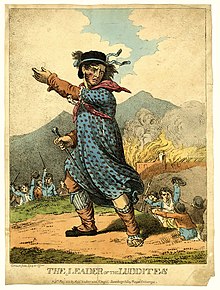
The Luddites were members of a 19th-century movement of English textile workers who opposed the use of certain types of automated machinery due to concerns relating to worker pay and output quality. They often destroyed the machines in organised raids.[1][2] Members of the group referred to themselves as Luddites, self-described followers of "Ned Ludd", a legendary weaver whose name was used as a pseudonym in threatening letters to mill owners and government officials.[3]
The Luddite movement began in Nottingham, England, and spread to the North West and Yorkshire between 1811 and 1816.[4] Mill and factory owners took to shooting protesters and eventually the movement was suppressed by legal and military force, which included execution and penal transportation of accused and convicted Luddites.[5]
Over time, the term has been used to refer to those opposed to the introduction of new technologies.[6]
- ^ Cite error: The named reference
Conniffwas invoked but never defined (see the help page). - ^ "Who were the Luddites?". History.com. Archived from the original on 20 December 2016. Retrieved 12 December 2016.
- ^ Binfield, Kevin (2004). "Foreword". Writings of the Luddites. Johns Hopkins University Press. pp. xiv. ISBN 1421416964.
- ^ Linton, David (Fall 1992). "The Luddites: How Did They Get That Bad Reputation?". Labor History. 33 (4): 529–537. doi:10.1080/00236569200890281.
- ^ Cite error: The named reference
Trialswas invoked but never defined (see the help page). - ^ "Luddite (n.), sense 1.b". Oxford English Dictionary (Online ed.). Oxford University Press. March 2024. doi:10.1093/OED/5449079592. Retrieved 15 September 2024. (Subscription or participating institution membership required.)